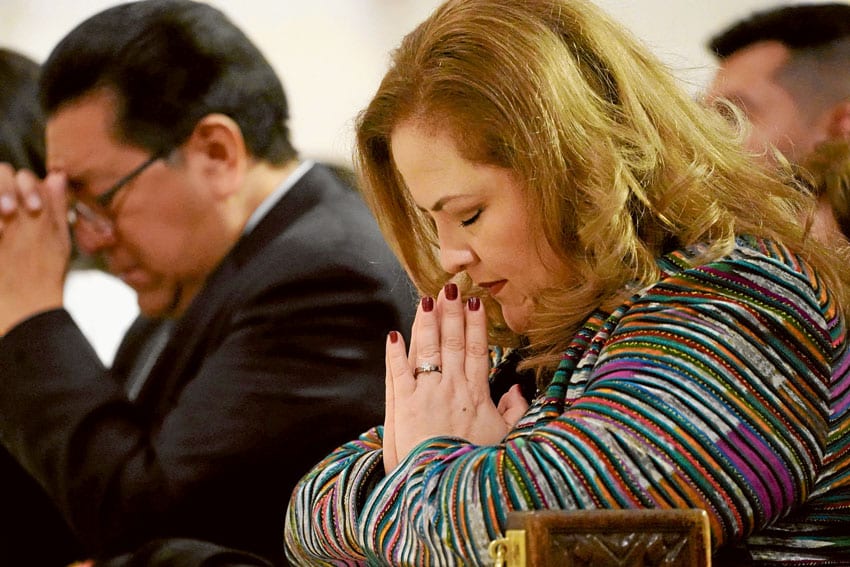
We used to belong to a parish that was a true community. It was genuinely diverse, with rich and poor people, old and young, able-bodied and impaired, and racially and culturally varied; but there was a sense of unity that I rarely experienced elsewhere, in any group of people of any kind, Catholic or otherwise.
When we got on the parish mailing list, we started to get regular emails: So-and-so needs a ride to the doctor on Thursday; So-and-so needs help changing the oil in his car. I didn’t happen to give birth while we attended that church, but I can easily imagine the landslide of casseroles and hand-crocheted booties that would have come my way if I had.
There was a very clear spirit of love present, and it was concrete and immediate, not abstract. They did have programs and official groups, but there was also a constant exchange of help and concern between individuals, one to one.
It’s tragic that this parish stands out in my head, rather than being the norm. Part of the magic was, of course, that it was small.
Of course little parishes aren’t automatically kind and generous and warm and giving, but they CAN be. But more and more in the 21st century, they don’t have the chance, because smaller churches are shuttered and de-consecrated, to be transformed into condos or pubs, or just bulldozed; and their former congregations are shunted into high capacity consolidated churches that can serve a wide community.
This is partly because of poor attendance. You can’t pay for lights and heat and insurance if hardly anyone is turning up. But it’s also because astronomically huge gobs of money are going to pay off sex abuse lawsuits, and there’s none left to pay for things like, well, keeping lots of little churches open.
Don’t get me wrong: Victims should be paid. Pressure on parishes is not their fault. But this slow-moving avalanche of the sex abuse scandal is largely crushing other innocent people, and because of the sins of some perverts in pointy hats, people who depended on the Church for help can no longer get it.

And so it goes. Each time a little church closes due to financial strain, there’s one less opportunity for a little gem of a parish to become a warm, busy little hub of charity in the name of Christ.
In big parishes, of course, it’s still possible for the church to care for needy people, whether what they need is food or clothing or help with their electric bills or help finding a job. But what often happens, if the money is there at all, is that there’s a program for everything: A program to feed the homeless, a program for divorcees, a program for widows, a program for youths.
It’s a good thing for needs to be served. Sometimes it’s a matter of life and death. But there are grievous drawbacks to the “there’s a program for that” model.
It segregates people, rather than integrating them. This segregation and specialisation is less of a problem if, when I’m needy, I have a solid community behind me elsewhere, and I don’t desperately need it from the church.
But chances are, if I’m in need, I need more than practical help. Chances are, I need practical help, but I also need to feel like I’m not alone.
I need to feel like someone sees me and realises my suffering is real, and I am real. Chances are I need to feel like I’m part of something, like I have something in common with all those anonymous backs hunched over their music issues.
I need to feel that, when I am in need, the people who will help me are the people who profess to worship the same God I worship.
In theory, we come to the Church for the sacraments that no one else can offer; but in practice, normal human people are going to have a hard time seeing Jesus, the giver of life, in a crowd of people that acts like they don’t exist.
I’m not talking about shiny grins and hugs and professional greeters. I’m talking about sincere, human interaction between people who profess to be brothers and sisters in Christ.
Never underestimate the damage that is done when a needy person sees his fellow Catholics kneeling before the crucified Christ but then sneering at an unwed mother; beating his breast for the confiteor but then scowling at the homeless man lurking around the foyer; professing, “I believe in the communion of saints” but then rolling their eyes at the yips and moans of a Catholic with special needs.
If every Catholic I meet is cold and harsh and self-contained, it will be harder and harder to resist another church with fishy theology but warm and open hearts.
The “there’s a program for that” model also excuses people from making real contact with people in need, which means the giver is depriving himself of necessary spiritual growth.
Sometimes making a monetary contribution is the most appropriate way to support the efforts of the Church. There are some people, and some seasons of life, who truly don’t have hours and hours to contribute to serving lunch to the homeless or folding donated baby clothes for new moms; or sometimes what’s needed requires specialised training and resources — therapy, job training, medical care. So they’ll hear of a need and pitch in money, and money is good.
But it becomes a problem when people who do have time and energy and resources and skills cut a cheque and then wash their hands of the matter of charity — or, worse yet, when they don’t even do that, but instead participate in comfortable committees together with people of their same social class, passing resolutions and putting together flyers without ever putting their own behinds on the line. No one ever gained heaven by committee.
The bottom line is, churches truly are supposed to be places where the people of God come together, to worship the Lord and to serve the people right there with them in the same pew, in the same parish.
Jesus didn’t say “whenever it’s possible to press 3 and then 5 to be directed to the online form you can complete to apply for assistance, there I am with you.” That’s not what churches are for. Committees are not a substitute for community, for true human interaction.
Please do not misunderstand me. Organisation is necessary. When there are lots of people to serve, you have to have programs to help the largest number of people in the most efficient way. That’s just how it works; and God bless the labourers who serve in this capacity.
But no program is a substitute for human compassion, even if it keeps someone from starving.
So if we open our bulletin and see that our parish is bristling with programs and groups and services, we shouldn’t pat ourselves on the back and consider our obligation satisfied by proxy. We still have an obligation to make ourselves available to someone needier than us, in some way, large or small. It may be something as small as a sympathetic smile.
It may, indeed, be a cheque, written out to a family in your church in desperate need. But sooner or later, it really does have to be personal. It really does have to do with the needs of the people who are closest to you. Why else Christ insist that we come together?
Related article:
